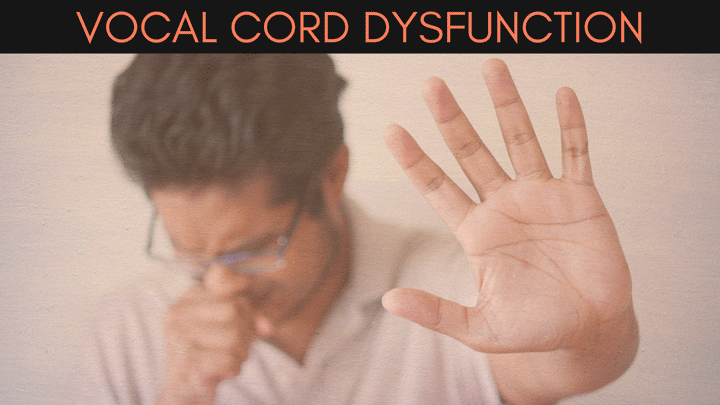Vocal Cord Dysfunction
January 23, 2023
Vocal Cord Dysfunction (VCD) - What is it?
Our Vocal Cords normally open as we breathe in air and remain open while we exhale. It’s also normal when we speak, sing, swallow, cough, or lift heavy things, that our vocal folds come together at different degrees of force. So what is Vocal Cord Dysfunction?
According to Mount Sinai, “Vocal Cord Dysfunction (VCD) is a breathing and voice symptom that is caused by restriction of the airway when you inhale. This unintended closure of the vocal cords causes the gasping sound you sometimes hear when exercising heavily.” They go on to explain that this continues to happen even while a person is at rest.
The Cleveland Clinic points out that many people suffering from VCD have a strained sound called stridor as they pull in air. This is the opposite sound we hear when a person is wheezing, which is a strained exhale. For this reason, VCD is often confused with asthma. Many people with asthma also have VCD as well. The American Academy of Allergy, Asthma and Immunology (AAAAI) describes that the key difference is how asthma is an allergic response starting in the immune system and VCD is not.
There are many other specific names for VCD such as Paradoxical Vocal Fold Motion (PVFM) that point to what medical experts think is potentially causing the condition in each situation. A VCD flare up often causes a person a lot of fear and panic as they struggle to breathe. Every healthcare resource states that you should not hesitate to go to an emergency room when struggling to breathe properly. While the disorder itself is actually not life threatening, don’t try to be an expert and self-diagnose if you are experiencing these symptoms!
So what causes VCD?
Many resources describe VCD as a learned muscle memory pattern that becomes involuntary as a habituated response to protecting our airway. There are a number of reasons this can happen including exposure to dust, chemicals, smoke, cold weather, extreme exercise, acid reflux, and other physical, emotional, and mental stressors. Excessive shouting and even singing can also be triggers.
Hopkins Medicine also mentions that many people experiencing VCD have very sensitive or reactive airways for a number of reasons. As I mentioned earlier, VCD often presents with other conditions, asthma being one of the most notable and common. The most important point to grasp here is, whatever the cause, the irritant is strong enough to elicit this lingering and distressing physical response.
Managing VCD
Many healthcare resources mention that VCD is not curable. This is a scary thing to hear! Healthcare practitioners are often managing expectations in a very careful way. They don’t like to make false promises and by profession are not going to claim anything without strong evidence for it yet. It’s common for someone who experiences VCD to have symptoms many times throughout their life to varying degrees.
Despite this sobering information, there are treatments and preventive measures to help reduce flare ups and the severity of symptoms you may experience.
The first one is to reduce any irritants that may be causing you to react in this way. So with the help of a healthcare professional, try and figure out what is happening when VCD is triggered.
The next step is to try and retrain the muscle memory response. Many experiencing VCD will undergo speech therapy, deep breathing exercises, and psychotherapy to manage stress and trauma. Occasionally, interventional surgeries and medications may be recommended to help open severely obstructed airways.
VCD from a Singing Teacher's Perspective
The Arizona Asthma and Allergy Institute provides some exercises to help someone with VCD to manage their symptoms. They go on to describe belly breathing, which is a ubiquitous term for any singer!
The instructions are to form a hissing sound with the tip of your tongue touching your teeth, and your lips close together. Anybody who knows my vocal practice, will immediately recognize this exercise as a fundamental part of our warm-up routine.
The other exercise is to breathe in, stick your tongue out past your lower teeth and lips, and then pulse your breath without using your voice with a Ha shape. The sound resembles a panting dog until you are done exhaling ( Ha, Ha, Ha, Ha..etc ). They mention that this motion may cause spasms, but will eventually retrain the muscles over time. As you guessed, anyone who knows my practice will understand the relationship your tongue has with decompression of the vocal folds and how tension here can contribute to the build up of unwanted vocal fold pressure while singing. While this exercise is specific for VCD, it resembles a similar practice to what we work on while singing.
So my hypothesis is that while singing incorrectly can cause VCD symptoms for some, a proper vocal practice could perhaps be helpful for many to reduce their symptoms and recurrence of VCD if done correctly and with the right intention. I would love for more collaboration between singing teachers, speech therapists, and laryngologists as I see a potentially promising VCD specific routine could be developed as a result.
Conclusion
Singing practice for me is largely about retraining muscle memory for ideal vocal fold manipulation. It requires belly breathing and an ability to find flexibility with our tongue. Healthy singing is a process that sits between excessive vocal fold closing and excessive vocal fold opening. As a singer we are constantly finding this balance for an optimal tone.
This process, if done correctly, teaches you better control over these muscles. I’m a firm believer that the pursuit of singing with freedom is a wellness activity and it may have the potential to help many people with conditions such as VCD.
However, specific training and research is needed to affirm this! Similar to those medical experts, I would say that the benefit is unknown and it's important to manage expectations. Nevertheless, I see potential and a cross-over here in this regard, and I am eager to see what develops as we continue to help those suffering from VCD manage their condition.


